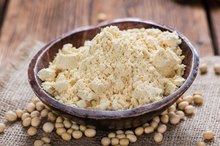Side Effects of Chocolate Soy Milk
You may find chocolate soy milk to be a refreshing and sweet drink, as well as a healthy one. The National Center for Complementary and Alternative Medicine reports that soy milk contains lots of protein and may have positive health benefits like reducing cholesterol levels and helping to alleviate symptoms of menopause. But chocolate soy milk can also present several health risks and negative side effects.
Gastrointestinal Distress
Some people may experience gastrointestinal discomfort or distress after drinking chocolate soy milk, especially if they drink a large quantity all at once. Soy-related gastrointestinal side effects often include diarrhea, stomach aches or cramps, and constipation, according to the National Institutes of Health.
Carbohydrate- and Calorie-Related Effects
Symptoms of Allergies to Chickpeas and Soy
Learn More
A cup of average chocolate soy milk contains approximately 24 grams of carbohydrates, much of it sugar, and 153 calories, according to NutritionData's analysis. This may lead to weight gain if you consume more sugars and calories than you expend on a daily basis. Additionally, the high amount of sugar may influence blood sugar levels, an issue of critical importance for diabetics.
Allergic Reactions
Though rare, some people have soy allergies. If you're allergic to soy and drink chocolate soy milk, you may experience a skin rash or difficulty breathing, warns the National Center for Complementary and Alternative Medicine.
Cancer Risks
How Much Chocolate Is Safe When You Are Pregnant?
Learn More
The University of Maryland Medical Center expresses concern regarding increased breast cancer risks due to the consumption of soy milk and other soy products. This is because soy milk contains plant-based estrogen. Though research conflicts regarding the seriousness of this issue, the center suggests that women with breast cancer should avoid drinking soy milk and eating soy products of any sort.
Gout Risks
Soy milk contains purine, a substance that may make your gout worse, according to the National Institutes of Health. They suggest avoiding soy consumption if you have gout.
Kidney Disease Risks
A cup of chocolate soy milk contains approximately 124 mg of phosphorous, or 12 percent of your recommended daily intake. The University of Maryland Medical Center says this is much higher than what's found in other food sources, like poultry and meat. This may worsen your health condition if you have kidney disease, warns the center.
Related Articles
References
- NutritionData: Soymilk, Chocolate, Unfortified
- National Institutes of Health: Soy
- National Center for Complementary and Alternative Medicine: Soy
- University of Maryland Medical Center: Soy
- Škof B, Rotovnik Kozjek N. A comparison of dietary habits between recreational runners and a randomly selected adult population in Slovenia. Zdr Varst. 2015;54(3):212-21. doi:10.1515/sjph-2015-0030
- Nieves JW, Melsop K, Curtis M, et al. Nutritional factors that influence change in bone density and stress fracture risk among young female cross-country runners. PM R. 2010;2(8):740-50. doi:10.1016/j.pmrj.2010.04.020
- Rautiainen S, Wang L, Lee IM, Manson JE, Buring JE, Sesso HD. Dairy consumption in association with weight change and risk of becoming overweight or obese in middle-aged and older women: a prospective cohort study. Am J Clin Nutr. 2016;103(4):979-88. doi:10.3945/ajcn.115.118406
- de Oliveira EP, Burini RC. The impact of physical exercise on the gastrointestinal tract. Curr Opin Clin Nutr Metab Care. 2009;12(5):533-8. doi:10.1097/mco.0b013e32832e6776
- Pritchett K, Pritchett R. Chocolate milk: a post-exercise recovery beverage for endurance sports. Med Sport Sci. 2012;59:127-134. doi:10.1159/000341954
- Karfonta K, Lunn W, Colletto M, Anderson J, Rodriguez N. Chocolate milk and glycogen replenishment after endurance exercise in moderately trained males. Med Sci Sports Exerc. 2010;42(5):86. doi:10.1249/01.MSS.0000385622.48600.1e
- Lunn WR, Pasiakos SM, Colletto MR, et al. Chocolate milk and endurance exercise recovery: protein balance, glycogen, and performance. Med Sci Sports Exerc. 2012;44(4):682-91. doi:10.1249/MSS.0b013e3182364162
- Muth ND. Sports Nutrition for Health Professionals. Philadelphia: F.A. Davis Company; 2015.
Writer Bio
Joshua Duvauchelle is a certified personal trainer and health journalist, relationships expert and gardening specialist. His articles and advice have appeared in dozens of magazines, including exercise workouts in Shape, relationship guides for Alive and lifestyle tips for Lifehacker. In his spare time, he enjoys yoga and urban patio gardening.









